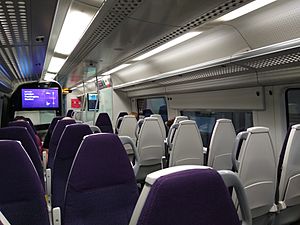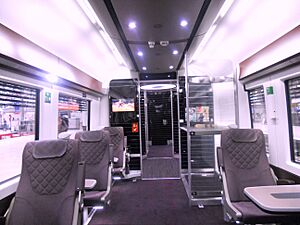Heathrow Express facts for kids
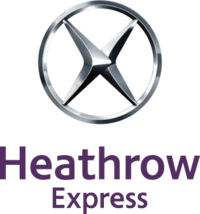 |
|
|---|---|
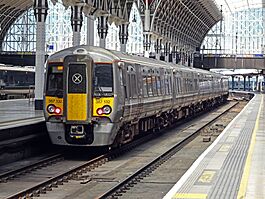
A Heathrow Express Class 387 at London Paddington in 2021
|
|
| Franchise(s): | Open access operator Not subject to franchising 23 June 1998 – 2028 |
| Main route(s): | London Paddington – Heathrow Airport |
| Fleet size: | 12 Class 387 |
| Stations called at: | 3 |
| Stations operated: | 3 |
| National Rail abbreviation: | HX |
| Parent company: | Heathrow Airport Holdings |
The Heathrow Express is a special train service that connects London Heathrow Airport with London Paddington station. It's a very fast train that doesn't stop, making the journey in just 15 minutes. This service started in 1998. Around 16,000 passengers use it every day. It is operated by Great Western Railway and a company owned by Heathrow Airport.
Contents
History of the Heathrow Express
Why the Express Was Needed
London Heathrow Airport is a very busy international airport. In the late 1970s, it was connected to the London Underground (the Tube). However, a trip to central London on the Tube's Piccadilly line took about 40 to 50 minutes. This was considered too slow for an important airport. People wanted a faster, more direct train link.
In the 1980s, a study suggested building a non-stop train service between London and Heathrow. In 1988, the government approved a plan between the British Airports Authority (BAA) and British Rail to build this new line. They hoped it would open by 1993.
A special law was passed in 1991 to allow the project to go ahead. BAA agreed to pay 80% of the costs, and British Rail would pay 20%. The contract to build the line was signed in 1993. After British Rail became a private company in 1993, BAA took over the project completely in 1996.
Building the Railway Line
Construction of the Heathrow Express line began in 1993. It was expected to cost about £350 million. The main parts of the project included building two long tunnels, each about 6.8 kilometers (4.2 miles) long. They also built underground stations at Heathrow Central and Terminal 4.
The existing railway line from Paddington to the airport also needed new electric power lines. This was important to make sure the trains could travel fast enough for the 15-minute journey. A special bridge was built to connect the new tunnel to the main railway lines. Builders also tried to make sure the new railway didn't harm the environment or look bad.
In 1994, a part of a tunnel collapsed during construction. This caused the ground above to sink and created large holes. This accident delayed the opening of the service by six months. It also added about £150 million to the cost.
Opening and Early Years
In January 1998, a temporary service called Heathrow FastTrain started running. It went to a temporary station, and passengers then took a bus to the airport. The full Heathrow Express service officially opened on June 23, 1998. The Prime Minister, Tony Blair, helped open the new service. The look of the trains, staff uniforms, and stations were all specially designed.
From 1999 to 2003, passengers could check in their luggage at Paddington station. This meant they could drop off their bags before even getting on the train. The luggage was then sent to the airport on the train. However, this service was stopped because not many people used it, and it was expensive to run.
In March 2008, the Heathrow Express service was extended to the new Heathrow Terminal 5 station when Terminal 5 opened. In 2010, a special shuttle train was added between Heathrow Central and Terminal 4. This made it easier for passengers to travel between these terminals.
In 2009, screens showing flight information were added at London Paddington station. By 2017, over 100 million passengers had used the Heathrow Express since it first opened.
In March 2018, the agreement for Heathrow Express to operate was extended until 2028. In August 2018, Great Western Railway (GWR) took over running the trains. Heathrow Airport still handles things like marketing and ticket prices. In December 2020, brand new trains were introduced, replacing the older ones that had been used since 1998.
Heathrow Connect and the Elizabeth Line
In 2005, Heathrow Express also helped run a new service called Heathrow Connect. This was a slower train that stopped at more stations between Paddington and Heathrow. It ran twice an hour. Heathrow Airport provided the staff for this service.
In May 2018, Heathrow Connect became part of TfL Rail, which was a step towards the new Crossrail project. In May 2022, TfL Rail services were renamed the Elizabeth line. From November 2022, Elizabeth line trains started running through central London. Heathrow Express trains still only go between Paddington and Heathrow.
How the Service Works
| Route | tph | Intermediate stops |
|---|---|---|
| London Paddington – Heathrow Terminal 5 | 4 | Heathrow Terminals 2 & 3 |
Trains leave Paddington every 15 minutes. The first train is at 5:10 AM (6:10 AM on Sundays), and the last is at 11:25 PM. Trains run just as often in the other direction. At Paddington, Heathrow Express trains usually use platforms 6 and 7.
There are two stops at Heathrow:
- Heathrow Terminals 2 & 3: This stop is 15 minutes from Paddington.
- Heathrow Terminal 5: This stop is 21 minutes from Paddington.
Passengers can travel between the Heathrow terminals for free. If you need to go to Heathrow Terminal 4, you can change to an Elizabeth line train at Heathrow Terminals 2 & 3 station.
On Board the Train
Heathrow Express trains offer two types of travel:
- Express Class: This is like standard class.
- Business First Class: This is like first class.
Both classes are easy to use for everyone. They have lots of space for luggage and free Wi-Fi. Business First class has wider seats and tables. It also offers 'Fast Track' security at the airport, which means you can get through security faster.
Children under 16 can travel for free if they are with an adult who has a ticket. If children are traveling alone, they can travel for free in Express Class only. They need to show proof of a flight to or from Heathrow on the same day.
The Train Route
The Heathrow Express uses part of Network Rail's Great Western Main Line from Paddington. The section from Airport Junction to the airport terminals is owned by Heathrow Airport Holdings. However, Network Rail still maintains this part of the line. The line uses electric power from overhead wires. It also has special safety systems for trains. The main control center for the entire route is in Didcot.
Stations on the Route
| Station | Image | Time from Paddington |
|---|---|---|
| London Paddington |  |
Start |
| Heathrow Terminals 2 & 3 | 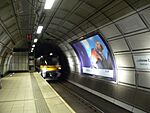 |
15 minutes |
| Heathrow Terminal 5 | 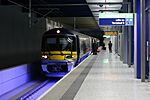 |
21 minutes |
The Trains Used
Current Trains
Since December 29, 2020, the Heathrow Express has used Class 387 trains. There are twelve of these trains. They replaced the older Class 332 trains. These Class 387 trains came from Great Western Railway, which also takes care of their maintenance.
Before they started service, the Class 387 trains were updated. They got USB charging points, more space for luggage, work tables, Wi-Fi, and HD TVs. The new Business First cabin has wider, reclining seats.
| Class | Image | Type | Top speed | Number | Carriages | Routes | Built | |
|---|---|---|---|---|---|---|---|---|
| mph | km/h | |||||||
| 387 Electrostar | 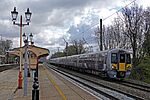 |
EMU | 110 | 177 | 12 | 4 | London Paddington – Heathrow Terminal 5 | 2016–2017 |
Past Trains
The first trains used by Heathrow Express were Class 332 trainsets. Fourteen of these trains were ordered in 1994 and started service in 1998. More carriages were added later to make some trains longer.
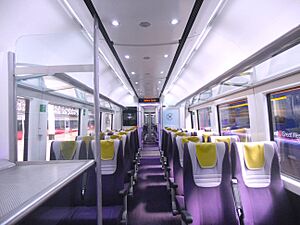
Until May 2018, Heathrow Express also used one Class 360 train. This train ran the shuttle service between Heathrow Central and Terminal 4. After the Class 360 was removed, only the Class 332 trains were used for all Heathrow Express services.
In 2019, it was announced that the Class 332 trains would be replaced by the new Class 387 trains. The first Class 332 train was taken out of service in November 2020. By December 28, 2020, all of the Class 332 trains had been replaced.
| Class | Image | Type | Top speed | Number | Carriages | Built | |
|---|---|---|---|---|---|---|---|
| mph | km/h | ||||||
| 332 | 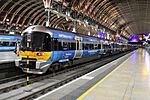 |
EMU | 100 | 161 | 9 | 4 | 1997–1998 |
| 5 | 5 | ||||||
| 360/2 Desiro | 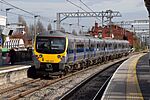 |
EMU | 100 | 161 | 1 | 5 | 2002–2005 |
Other Airport Express Services
- Gatwick Express - a similar fast train service between London Victoria station and Gatwick Airport
- Stansted Express - a similar fast train service between London Liverpool Street station and London Stansted Airport
- Luton Airport Express - a similar fast train service between London St Pancras station and London Luton Airport
 | Madam C. J. Walker |
 | Janet Emerson Bashen |
 | Annie Turnbo Malone |
 | Maggie L. Walker |


